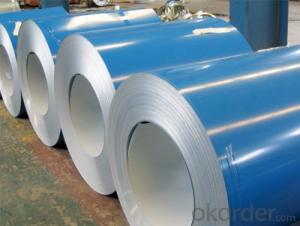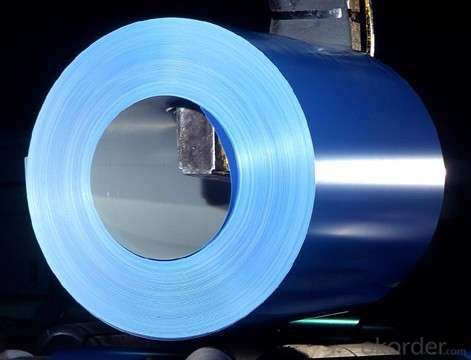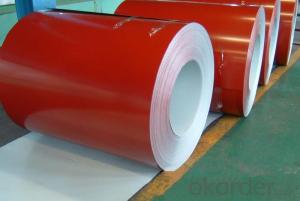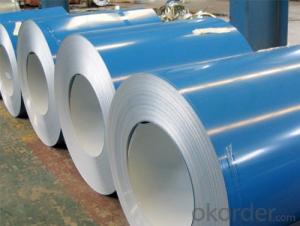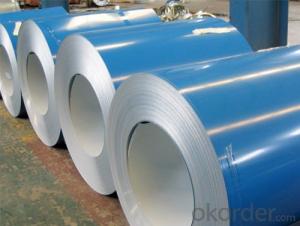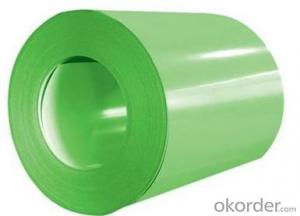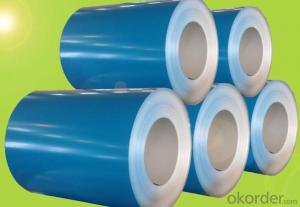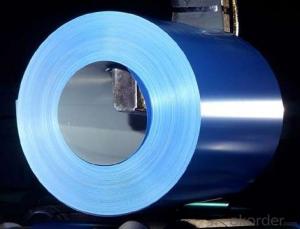Pre - painted Galvanized/Aluzinc Steel Sheet Coil with Prime Quality and Lowest Price
- Loading Port:
- Shanghai
- Payment Terms:
- TT OR LC
- Min Order Qty:
- 100 m.t.
- Supply Capability:
- 10000 m.t./month
OKorder Service Pledge
OKorder Financial Service
You Might Also Like
1.Structure of Pre-painted Galvanized/Aluzinc Steel Coil Description
With GI (aluzinc) as base metal, after pretreatment (degrease and chemical treatment) and liquid dope with several layers of color, then after firing and cooling, It generally displays workability, durability and weather resistance.
2.Main Features of the Pre-painted Galvanized/Aluzinc Steel Coil
• Excellent corrosion resistance
• Excellent weather resistance
• High strength
• Good formability
• Good visual effect
3.Pre-painted Galvanized/Aluzinc Steel Coil Images
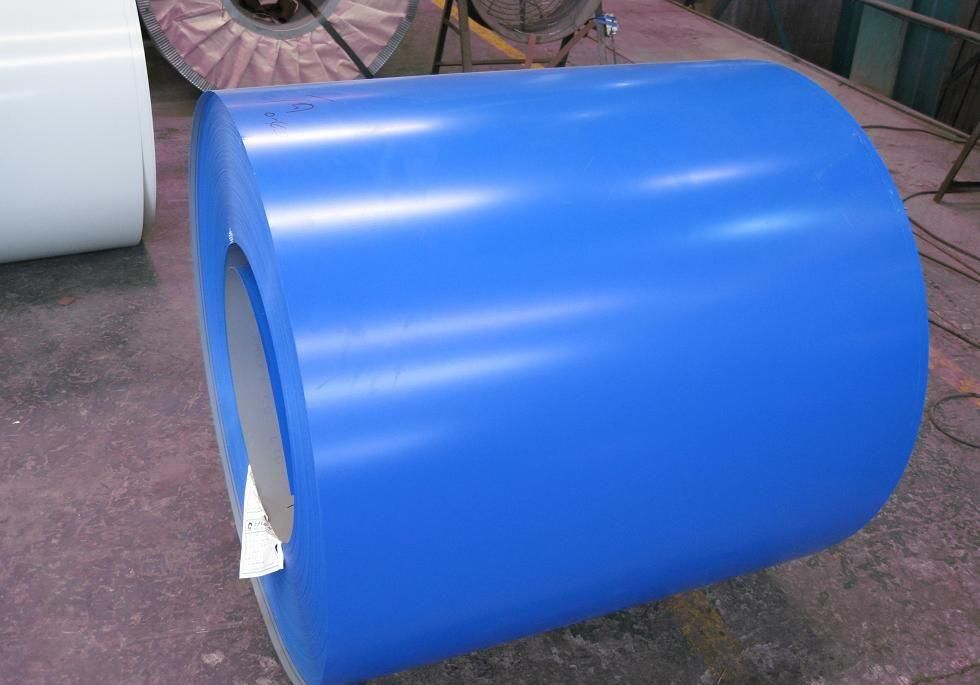
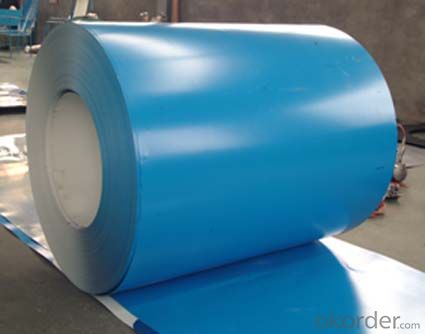
4.Pre-painted Galvanized/Aluzinc Steel Coil Specification
Finish by coil or sheet: Both sheet and coil are available
8Zinc coating: 60-275G/M2, both sides
Paint thickness for top side : 5 micron primer + (10-20) microns modified polyester, any RAL color code.
Paint thickness for back side: (5-10) microns Epoxy
Weight per coil: 4-6 tons, also can be upon customer's requirements
Max loading weight in one 20ft container : 25 tons generally
Quality standar: JIS G3312 CGCC & CGLCC
Hardness of P: Both soft and hard quality are available
Surface finish: with or without protect film
Thickness : 0.14-1.20 mm
Width : 914mm, 1000mm, 1220mm and 1250mm, thickness 600-1250mm is available
5. FAQ of Pre-painted Galvanized/Aluzinc Steel Coil
We have organized several common questions for our clients,may help you sincerely:
1. What is the minimum order quantity ?
we will consider to give more discount if you make big order like 1000 tons and more. Further more, the more appropriate payment term your offer the better price we can provide.
3. How to guarantee the quality of the products?
every link from raw material to final product we have strict quality test;We resolutely put an end to unqualified products flowing into the market. At the same time, we will provide necessary follow-up service assurance.
- Q: where can i find information online about steel residential homes that use solar energy?
- Guide okorder /
- Q: How are steel coils used in the production of pressure vessels?
- Steel coils are used in the production of pressure vessels as they are rolled into cylindrical shapes, which serve as the main structural component of the vessel. The coils are formed and welded together to create a strong and durable container capable of withstanding high pressures.
- Q: What is the maximum length of a steel coil?
- The maximum length of a steel coil can vary depending on various factors such as the type of steel, manufacturing process, and intended use. However, in general, steel coils can range from several hundred feet to several thousand feet in length.
- Q: How are steel coils inspected for straightness?
- To ensure compliance with quality standards, steel coils undergo a variety of methods to inspect their straightness. Among these, visual inspection is commonly employed, wherein trained inspectors meticulously examine the coil's edges, surface, and overall shape for any visible flaws or irregularities that might indicate a lack of straightness. An alternative approach involves measuring the coil's straightness using precise instruments. This entails taking measurements at different points along the coil's length and comparing them to specified tolerances. Accurate assessment of the deviation from the desired straightness is achieved using techniques like laser measurements or straightness gauges. Moreover, certain coils undergo non-destructive testing, such as magnetic particle inspection or ultrasonic testing, to uncover any internal defects or stresses that may impact their straightness. These tests are capable of identifying hidden flaws that visual inspection alone may fail to detect. Additionally, some manufacturers employ automated inspection systems that leverage advanced technologies like computer vision or artificial intelligence. These systems swiftly scan the coil's surface and analyze it for any deviations from straightness, generating precise measurements and ensuring consistent quality. In summary, the inspection of steel coils to verify their straightness involves a combination of visual inspection, precise measurements, non-destructive testing, and advanced technologies. These methods work together to identify any deviations from the specified straightness, ensuring that only coils meeting the required standards are utilized in various applications.
- Q: What is the process for uncoiling and recoiling steel coils?
- To ensure the safe and efficient handling of steel coils, several steps are involved in the process of uncoiling and recoiling. Firstly, the steel coils are transported to the desired location using cranes or forklifts and carefully unloaded from the transportation vehicle. They are then placed in a designated area. Before uncoiling, it is crucial to inspect the steel coils for any damage or defects. This step ensures that only quality coils are further processed. Once inspected, the steel coils are secured to prevent any movement during the uncoiling process. Clamps or straps are used to hold the coils firmly in place. Uncoiling involves gradually unwinding the steel coil, which can be done manually or using specialized machinery such as uncoilers or decoilers. The coil is typically fed through a series of rollers that guide the unwinding process. In some cases, the steel coil may need to be straightened before further processing. Straightening machines apply pressure to remove any bends or twists in the steel. If necessary, the uncoiled steel coil may be cut into smaller sections or sheets using shearing machines or other cutting tools. The dimensions and size of the cuts depend on the specific project requirements. Once the desired processing steps are completed, the steel coil can be recoiled. This involves rewinding the steel into a new coil shape, which can be done manually or using recoilers. Recoilers wind the steel evenly and tightly to maintain its integrity. After recoiling, the steel coils are typically packaged and stored for further transportation or use. They may be wrapped in protective materials such as plastic or metal sheets to prevent corrosion or damage. In conclusion, the process of uncoiling and recoiling steel coils requires careful handling, inspection, and the use of specialized machinery. By following these steps, steel coils can be efficiently processed and prepared for various applications in industries such as construction, automotive, and manufacturing.
- Q: Are steel coils corrosion-resistant?
- Yes, steel coils can be corrosion-resistant depending on the type of steel used and any additional protective coatings applied.
- Q: How are steel coils used in the production of automotive frames?
- Steel coils are used in the production of automotive frames as they provide the necessary strength and durability. These coils are typically formed into specific shapes and sizes, which are then welded together to create the frame structure. The high tensile strength of steel coils ensures that the automotive frame can withstand the various stresses and strains experienced during vehicle operation, ensuring safety and stability.
- Q: I just want regular steel, not stainless steel.
- If it rusts, magnetic, hard, heavy with high melting point I reckon yourve found mild steel.
- Q: Moravia’s coal and steel industries face challenges because they _____. a.do not run efficientlyb.have run out of resourcesc.have a declining work forced.have not privatized
- As someone who have lived in northern Moravia at industrial steel and coal city of Ostrava, the closest point is b), but it is questionable. I am not sure how to compare efficiency of largest steel mill in Czech Republic in comparison to China which is the biggest exporter, but Czech steel factories were modernized and run more efficient that 25-35 years ago, and been privatized and owned by Mittal. The workforce had been shrinking, so not exactly sure what that c is pointing to (aging of workforce, size of it, or quality). Northern Moravia is a part of larger coal basin that extend to Poland with large coal deposits. This was foundation for the steel industry in the 1800's together with large ore deposits that was mined in proximity of the Beskidy mountains less than 25 miles from Ostrava. The iron ore mines had been depleted for several decades, and since the late 70's when communists run the country, they were already importing Soviet iron ore. Coal mining within city of Ostrava cased to exist in the 1990's due environmental issues, and also cost. The mines were getting deeper and more costly to operate and there is no more mining within Ostrava. Couple mines are still in operation in Karvina county which is next to Ostrava. Currently the coal deposits south of the city were not opened due environmental issue which would mean destruction of third largest mountain range in the country. Therefore, my conclusion is is b, as the ore and coal resources been shrinking. The biggest challenge not mentioned here is of course competition from Russia, Ukraine, and China, which can produce steel much cheaper.
- Q: How do steel coils contribute to the packaging industry?
- Steel coils play a crucial role in the packaging industry by providing a durable and versatile material for packaging various products. The use of steel coils in packaging ensures the protection and preservation of goods during transportation and storage. One way steel coils contribute to the packaging industry is through their strength and durability. Steel is known for its high strength-to-weight ratio, making it an ideal material for packaging heavy and bulky items. Steel coils can withstand significant pressure and impact, ensuring that goods remain intact and undamaged throughout the supply chain. This strength also allows for the stacking of packages, optimizing storage space and reducing the risk of damage. Furthermore, steel coils are highly resistant to corrosion and moisture. This property is particularly important in the packaging industry as it helps protect goods from environmental factors that could potentially compromise their quality. Steel coils can be coated or treated to enhance their corrosion resistance, ensuring that packaged products remain in pristine condition. Steel coils are also versatile and can be easily customized to suit specific packaging requirements. They can be cut and shaped into various forms, such as sheets, straps, or bands, to secure and protect different types of products. Additionally, steel coils can be easily integrated with other packaging materials, such as cardboard or plastic, to provide added strength and stability. Another benefit of steel coils in the packaging industry is their recyclability. Steel is one of the most recycled materials globally, and steel coils can be easily recycled and reused. This sustainability aspect makes steel coils an environmentally friendly choice for packaging, contributing to the reduction of waste and the conservation of resources. In summary, steel coils play a vital role in the packaging industry by offering strength, durability, corrosion resistance, versatility, and recyclability. Their use ensures the safe transport and storage of goods, providing a reliable and sustainable packaging solution for a wide range of industries.
Send your message to us
Pre - painted Galvanized/Aluzinc Steel Sheet Coil with Prime Quality and Lowest Price
- Loading Port:
- Shanghai
- Payment Terms:
- TT OR LC
- Min Order Qty:
- 100 m.t.
- Supply Capability:
- 10000 m.t./month
OKorder Service Pledge
OKorder Financial Service
Similar products
Hot products
Hot Searches
Related keywords
